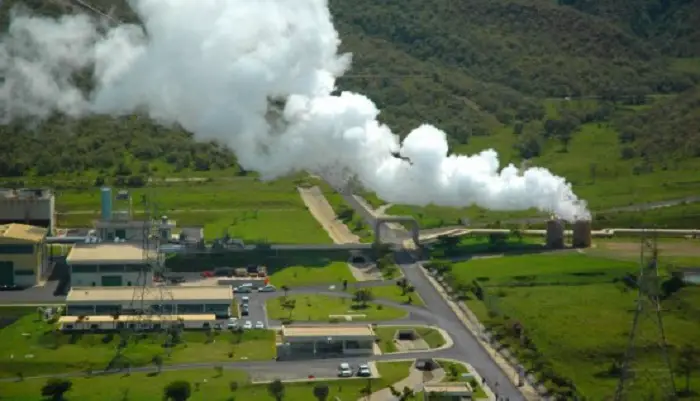In a bid to commence operations of the 35-MW geothermal power plant of Sosian Energy by the end of the month, the wells in the Menengai geothermal steam field in Kenya are currently being opened.
The Menengai steam field will be used to generate electricity for the first time by Sosian Energy, an independent power producer (IPP). The projected commencement of operations is June 2023, which is in line with previous forecasts.
Five of the twelve wells intended for the power plant’s use have already been opened, according to Eng. Edwin Odum of the Geothermal Development Company’s (GDC) Resource Management Department. The Menengai Crater geothermal wells were drilled by the state-owned GDC, which also constructed the steam field’s steam gathering systems.
Read also: Construction of a 75MW wind power plant in Chenini, Tunisia, in the offing
In order to guarantee that the steam won’t damage the power plant’s turbines, Odum said that the wells will be left open for a week while a target plate test is carried out. The Sosian Energy facilities will receive the steam if it is assessed to be of good quality.
Sosian Energy is one of the three IPPS that was granted permission to construct and operate geothermal power plants in Menengai. Sosian Energy operates through Sosian Menengai Geothermal Power Ltd. (SMGPL).
It is expected that each IPP will construct a 35-MW geothermal power plant in Menengai.
Menengai Geothermal Project Overview
With a potential of 1600MW, the Menengai Geothermal project is being developed in five (5) phases with the long-term goal of developing an equivalent of 465MW of geothermal steam.
The first phase of the project is being undertaken through a steam sales business model. Upon completion, this phase will have a capacity of 105MW. The second phase, on the other hand, is expected to generate 60MW steam equivalent. This phase will be located in the eastern sector of the Menengai Caldera.
Lastly, Menengai Phases III, IV, and V are located to the greater Northern West of the Menengai Caldera.
Reported earlier
March 2013
Developing Menengai Geothermal Steam Field
 Menengai’s geothermal steam field development project will set the stage for investments that will help meet Kenya’s rapidly increasing demand for power and transform the country into a competitive clean energy economy.
Menengai’s geothermal steam field development project will set the stage for investments that will help meet Kenya’s rapidly increasing demand for power and transform the country into a competitive clean energy economy.
African Development Bank (AfDB) approved two financing vehicles to support the project. It will be financed through a loan of USD$124 million from the African Development Fund (ADF) concessionary resources, and a loan and grant totaling US$25 million from the scaling-up renewable energy program under the Climate investment funds for which AfDB Group is an implementing agency.
The Menengai field has a potential of up to 1600MW, and the AfDB Group support will help develop the steam field for a generation capacity of up to 400MW in the first phase, which represents a 20% increase in installed capacity of the country.
May 2014
US firm to build 100MW geothermal power plant in Kenya
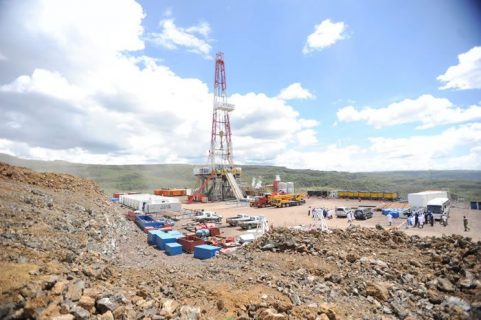
Ormat Technologies, a US power firm has been selected among three other companies to build the 100MW geothermal power plant in Menengai, Kenya, set to begin in December this year. This will be among other projects which will see Kenya’s energy capacity rise to 5,000MW from 1,533 MW.
The Geothermal Development Company (GDC) picked Ormat Technologies through its wholly-owned subsidiaries OrPower 4, Quantum Power, and local firm Sosian Energy to each build a 35MW steam power plant under a build own operate model.
It is projected that at least Sh45bn (US$500m) will be required monthly for the next 42 months to finance the generation of the ambitious 5,000MW power plants.
Kenya is now turning to clean and cheaper sources of energy such as geothermal, wind, solar, and liquefied natural gas to cut the cost of electricity to Sh9.10 (¢10.45) per kilowatt hour from the current average of Sh17.20 (¢19.78) per unit for domestic households.
Ormat Technologies is today’s vertically integrated provider of geothermal and recovered energy-based equipment, services and power that designs, develops, builds, and manufactures most of the equipment used in its plants.
April 2016
Two geothermal power projects in Kenya receive US$ 30m boost
Two geothermal power projects in Kenya have received a vital boost of US$ 30m from a Clean Technology Fund that is backed by six multilateral development banks. The concessional loan that was approved to finance the two power projects in Menengai will have the ability to produce an estimated total output of 70 megawatts (MW).
The Climate Investment Fund said the loan endorsed through its Clean Technology Fund component will tremendously assist in the expansion of Kenya’s output of clean energy through projects structured as Independent Power Producers and implemented with support from the African Development Bank.
Joao Duarte Cunha, the bank’s coordinator for Clean Technology Fund confirmed the reports and said that this initiative will help Kenya to reshape its future in renewable energy.
“At the moment, Kenya is demonstrating its ability to reshape its energy future by developing its vast geothermal resources through Menengai,” said Mr. Duarte.
However, he pointed out that Kenya still faces some market barriers to the full deployment of its renewable energy. This infusion of capital will thus serve to build investor confidence and improve the bankability of these vital resources. Furthermore, the success of the independent producers can serve as a beacon for other countries looking to achieve similar green energy goals.
The Climate Investment Fund is backed by several banks the AfDB, the Asian Development Bank, the European Bank for Reconstruction and Development, the European Investment Bank, the Inter-American Development Bank, and the World Bank Group. AfDB further said that it will support and build a track record in a nascent market and help reduce the country’s dependence on hydro and thermal power energy.
Geothermal energy is initially expensive to drill but it becomes more reliable over time than both hydro and thermal power since the two are prone to vagaries of weather and high international fuel prices.
May 2016
Menengai Geothermal power plant construction project in Kenya nears completion
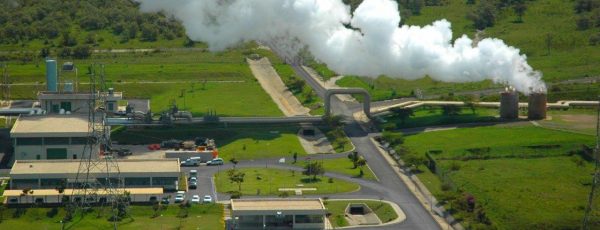
The Menengai Geothermal Power plant in Kenya which is a US$500m project currently under construction is anticipated to be complete by July this year; this is according to the African Development Bank (AfDB) Group.
AfDB’s Environment and Climate Manager Kurt Lonsway confirmed the news and said that the ongoing project is expected to cover the need of over 500,000 Kenyan households, 300,000 small businesses, and 1000GW for other businesses and industries.
“The mega project which is located within the Eastern Sector of the African Rift Valley about 180km North West of Nairobi has a potential of producing up to 1600MW,” Mr. Lonsway said during the AfDB Annual Meetings on Climate Change and Energy being held in Zambia.
He further pointed out that AfDB will assist in developing the steam field for a generation capacity of up to 400MW in the first phase and that the development will allow a substantial increase in the provision of clean, reliable, and affordable electricity to Kenyan citizens.
This is a very good initiative as it will assist in avoiding close to 540,000 tons of CO₂ per annum. Easy access to modern energy will help improve health and education opportunities, mainly for women and girls.
During the AfDB Annual Meeting, Kenya was highly commended as one of the few countries working hard to ensure renewable energy is applicable in its system. Kenya is among six countries in the whole of Africa that have commenced major initiatives to utilize solar and geothermal power, which as a result has led to over 10 GW of capacity contracted.
The Menengai geothermal power plant which is in line with Kenya’s green growth vision will play a major role in realizing Kenya’s speedily increasing demand for power and it is projected to generate approximately 150 MW of electricity per year.
Jun 2018
Menengai geothermal project receives US $49m funding
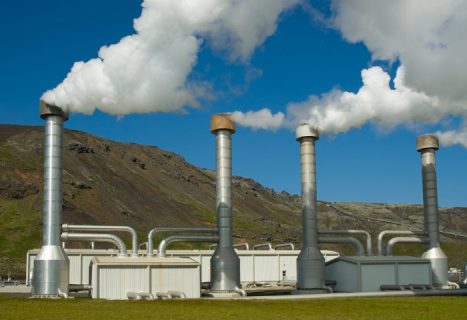
The African Development Bank (AfDB) has approved a senior loan of US $29.5m and a concessional loan of US $20m from the Climate Investment Funds (CIF) Clean Technology Fund (CTF) to Quantum Power East Africa GT Menengai.
The funding will be towards the development of a 35MW geothermal power plant at the Menengai geothermal field in Nakuru County, one of three modular geothermal plants in the Menengai field with a capacity of 105MW.
The project is part of the CTF Geothermal Concessional Finance Program under the Dedicated Private Sector Program designed to finance programs that can deliver development results, impact, private-sector leverage, and investment at scale and can be deployed rapidly and efficiently.
According to Amadou Hott, Vice-President, Power, Energy, Climate and Green Growth at the African Development Bank, Kenya has nearly 7,000MW of geothermal potential, yet only about 200MW is currently under development.
Furthermore, the partnership between the African Development Bank and the CIF to contribute to Kenya’s efforts in scaling up the development of this renewable resource and boosting economic growth is commendable. The deployment of CTF funds is directly contributing to unlocking the power of the private sector in driving long-lasting market transformation and mitigating risks in the geothermal power sector.”
Menengai geothermal project
Quantum Power-Menengai Geothermal Project, the second geothermal independent power project in the country, will strengthen public-private partnerships and enable the country to harness its abundant geothermal resources to provide reliable, low-cost, environmentally friendly base-load electricity.
The government of Kenya is also putting efforts into creating an enabling environment to enhance investment flows from private investors into the energy sector through the implementation of competitive tender processes in an attempt to lower the unit costs of geothermal power generation while lowering the costs of doing business and thus improving Kenya’s competitiveness in the region.
According to Anthony Nyong, Director for Climate Change and Green Growth at the Bank, The African Development Bank has invested considerable resources and time in the development of the Menengai geothermal steam field with the objective of enabling Kenya to find a productive source of steam for on-grid power generation.
The financial package in this project shows a strong commitment towards improving Kenya’s energy sector as well as tangible efforts to curb climate change and encourage green growth on the continent.
Jan 2018
Menengai Geothermal Project to be launched in March
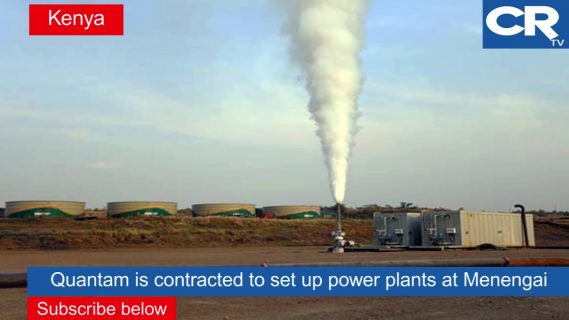
The Independent Power Producers (IPPs) of the Menengai Geothermal Project is set to host a ground-breaking ceremony for the first of the three power plants that are planned for construction in March 2018; this is according to Kenya’s Geothermal Development Company (GDC).
Quantam East Africa Power Limited will be breaking ground for the first 35MW power plant; the Sosian Menengai Geothermal Power Limited (SMGPL) will follow later.
This will be a key milestone for GDC as the project is hot on the heels of the government’s assurance of its support for Menengai.
In a statement, GDC managing director and CEO Eng. Johnson P. Ole Nchoe assured staff that with accelerated project timelines and delivery, he is confident that by March 2018, the project’s first IPP will enter the market.
“Both IPPs already have their letters of support and we trust that we will have banks on board to provide letters of credit. In addition, the steam gathering system is 90% complete and by March all should be fully complete,” he said.
Menengai Geothermal Project
The three IPPs licensed by GDC include Orpower 22 Limited, Sosian Menengai Geothermal Power Limited (SMGPL), and Quantam East Africa Power Limited.
They will generate and supply power to the national grid from the Menengai Geothermal Project. The companies also plan to invest US $210m in the construction of the power plants.
The project is going to give 500,000 households and 300,000 businesses access to low-cost power under the government’s 5,000MW initiative. Kenya Electricity Transmission Company Ltd (Ketraco) has already set up a 132kV substation that will transmit 105MW of power from the power plants.
Under the arrangement, GDC takes care of upfront risks, and invitations to private sector players to construct, own and operate the plants.
Jul 2018
Mauritian firm signs US $40m deal for Menengai geothermal plant
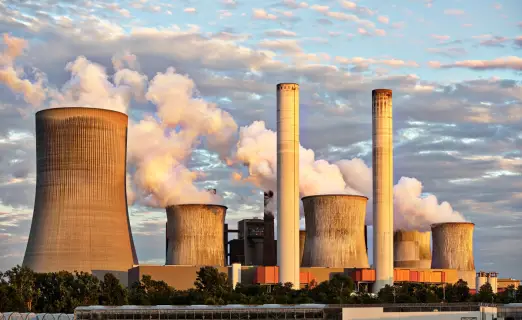
Kenya has received a major boost in the energy sector after a Mauritian firm signed a US $40m financial deal for the construction of Mauritian firm Quantum Power East Africa’s 35MW Menengai geothermal plant with the African Development Bank.
AfDB President, Akinwumi Adesina confirmed the statement and lauded the government for ensuring Kenyan personnel develops the plant, which is the biggest geothermal project in Africa.
IPPs contracted
The lender will provide the funds to Quantum Power, one of the three Independent Power Providers contracted by the Geothermal Development Company to build the 105-MW Menengai Geothermal power plant. The two contracted IPPs are American-Ormat Technologies and a local company, Sosian Energy.
“I look forward to the IPPs actually starting so that we can begin to see a lot of changes in the lives of the people around,” said Adesina during his tour of the plant.
Commencement of the geothermal project which had experienced delay since 2014 over lack of funding is set to begin in August with projected completion in 18 months.
The government has also issued letters of support to Quantum Power East Africa and Sosian Energy, paving the way for them to start constructing their plants. The three IPPs will each develop 35-MW plants that will see the Menengai Geothermal project generate 105-MW of clean energy upon completion of the first phase.
Steam Gathering System
Development of the evacuation line has also been completed by Kenya Electricity Transmission Company Limited, ensuring that power will be transmitted immediately upon generation. Geothermal Development Company is also finalizing the 25 Km Steam Gathering System that will channel the steam to the power plants for the generation of electricity.
Quantum Power becomes will become the first IPP to start developing its plant at a cost of US 82m. Sosian Energy also recently signed a pact with Korea Western Power for a 25-year Operations and Maintenance (O&M) program for its 35 MW geothermal plant.
April 2019
Kenya signs US $65m deal for construction of Menengai III geothermal power plant
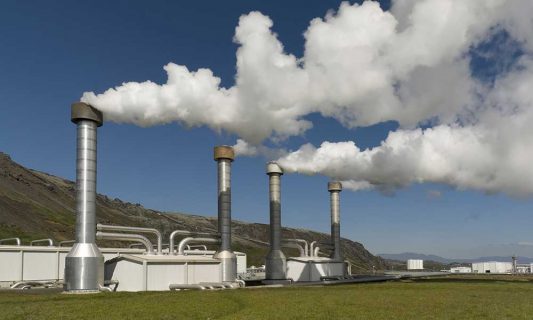
Kenya’s independent power producer (IPP) Sosian Energy has signed a deal worth US $65m with Chinese company Kaishan Renewable Energy Development, a subsidiary of Zhejiang Kaishan Compressor, to build the Menengai III geothermal power plant in the Rift Valley in western Kenya.
The project has the necessary permits for the construction, and operation of the plant, and for selling the electricity to Kenya National Power. Under the contract, the Chinese company has been tasked to drill geothermal wells and install pipes to transport steam to run the turbines of the geothermal power plant.
Zhejiang Kaishan has also won a US $18m contract to operate and maintain the future Menengai III geothermal power plant for a period of 14 years.
Menengai III geothermal power plant
Upon completion, the geothermal plant is projected to produce 34 MW of power. Sosian Energy, the owner of the plant, is one of the three PPIs selected for the development of the Menengai geothermal project. The other PPIs selected by the public company Geothermal Development Company (GDC) are Orpower Twenty Two and Quantum Power East Africa.
The three geothermal power plants under development will produce a total of 105 MW. This energy will be sold to Kenya Power, the company that provides the electricity utility. Moreover, Quantum Power East Africa is set to receive a loan of US $29.5m from AfDB for the development of the power plant while The Climate Investment Fund (CIF) (part of the Clean Technology Fund (CTF) has also committed to US $20m towards the project.
Oct 2019
Construction of the first geothermal power plant at Menengai Crater, Kenya, is to begin in December
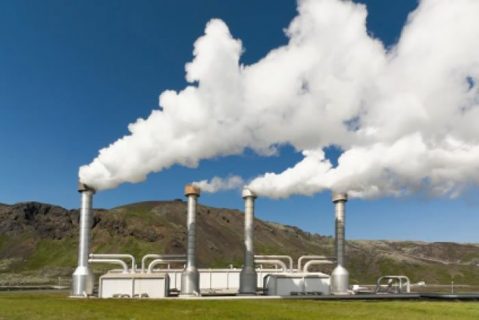
The construction of the first of three privately owned multi-million dollar geothermal power plants on the Menengai Crater in Nakuru, Kenya, is set to begin this coming December.
This is after the three Independent Power Producers (IPPS) behind the development were cleared by the Geothermal Development Company (GDC) and granted all the necessary licenses by the State to start operations at the Menengai Crater Floor.
Also Read: Kenya signs US $65m deal for construction of Menengai III geothermal power plant
The developer
The IPPs to develop the power plants, for which drilling was conducted by Geothermal Development Company (GDC) are, OrPower22 (Ormat), Quantum Power East Africa and Sosian Menengai Energy.
Each one of the three companies is expected to set up at least a 35MW modular geothermal power plant under a build-own-operate model (BOO) in the Menengai Crater field to generate a cumulative 170MW.
Project behind schedule
Erastus Mbui Mwenda, the Nakuru county commissioner while speaking when members of the Nakuru County Development Implementation Coordination Committee (CDICC) inspected the facility revealed that construction of the power plants was behind schedule.
A public tender for the project was released in September 2013 and the contract was awarded to the three companies. The PPA with Kenya Power was signed in October 2014, followed by a project implementation and steam supply agreement with GDC in October 2014. Drilling was done by GDC with H. Young building the steam gathering system under an EPC agreement. The project had been slated to kick off in January this year according to Mr. Mwenda.
Once completed, the Menengai Geothermal Station will produce enough electricity to serve almost half a million homesteads and 300,000 businesses.
Oct 2020
Construction of Menengai Geothermal Power Plant in Kenya complete
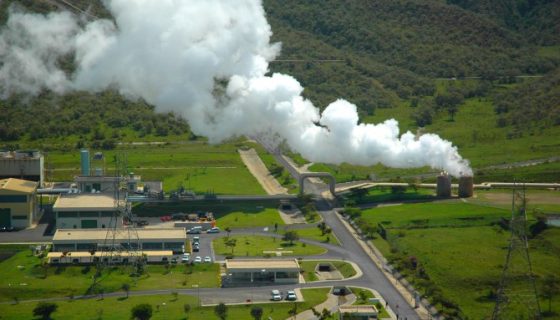
The construction of the Menengaï Geothermal Power Plant in Menengai, Nakuru County, Kenya, has been completed according to the project financer, African Development Bank (AfDB) Group, or Banque Africaine de Développement which is a multilateral development finance institution.
The US$108M project has added 105 MW of geothermal production capacity to the national electricity grid and brought up the national production of geothermal energy to 672 MWe which makes the East African country Africa’s leading producer of geothermal energy.
For the implementation of the project, 50 wells were targeted to generate enough steam to produce more than 100 MW. Some 49 wells had been drilled through the end of November last year, with a capacity of 169.9 MW which exceeded the initially estimated capacity.
With the completion of this project, Kenya will be able to connect approximately 500,000 households, including 70,000 in rural areas of the country to the national grid and overcome severe electricity shortages caused by the variability of hydropower generation. At the same time, it will also reduce CO2 emissions by about 600,000 tonnes as of 2022.
Low-Cost Electricity Development Plan
In 2011, the Republic of Kenya embarked on an ambitious path of renewable energy development with the adoption of the Low-Cost Electricity Development Plan for 2011-2031. This plan has been updated annually to increase power generation capacity from 1,227 MW in 2010 to 3,751 MW in 2018.
The East African country’s Medium-Term Plan 2008-2012 and its successors, PMT-II (2013-2018) and PMT-III (2018-2022), all part of the Vision 2030 development plan, aims to increase the country’s electricity generation capacity to 5,521 MW by the end of next year but one.
The PMT-III also aims to promote the development and use of renewable energy sources to create a reliable, good quality, and cost-effective electricity system to support industrial development.
Jun 2021
Geothermal Development Company to drill more wells in Rift Valley, Kenya
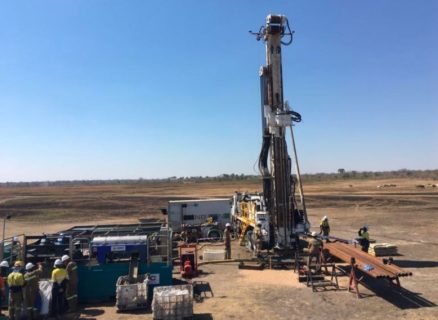
The Geothermal Development Company (GDC) has announced plans to drill more wells along the East Africa rift system that’s already home to Africa’s largest geothermal power plants at Olkaria in Naivasha and Menengai in the outskirts of Nakuru Town in Kenya
Mr Jared Othieno, the GDC Managing Director made the announcement and said the power firm also seeks to establish industrial heat parks in Baringo County, where GDC is drilling more wells in Paka, Korosi, and Silali.
This move follows a US $5m grant the company received from the Geothermal Risk Mitigation Facility in its bid to strengthen the country’s quest to boost the share of green energy in the national grid. The heat park concept is an approach where, apart from power generation, geothermal energy is used in industrial heating and for recreation and leisure.
Affordable energy
“Heat parks will transform Baringo County and the country at large. A heat park offering reliable and affordable energy will create jobs and boost the economy of the region,” said Mr. Jared Othieno.
Mr. Othieno spoke during a tour of the project accompanied by German Development Bank (KFW) officials. KFW is financing the first phase of the Baringo-Silali geothermal project at a cost of US $93m.
The Baringo-Silali block is estimated to have a potential of 3,000 MW. For the first phase, GDC aims at developing 300 MW by 2030 at the Paka, Korosi, and Silali fields. GDC recently struck a well at Paka Hills, boosting its quest to develop geothermal energy in the country.
Meanwhile, Nakuru County is banking on geothermal power to drive its industrial revolution. Nakuru County hopes to rely on geothermal energy to power its economy at a time when the drive to turn Naivasha into a major economic hub in Kenya and East Africa is gathering pace.
Dec 2022
Loan secured for Menengai geothermal power plant
A $72 million loan has been secured by Independent Power Producer (IPP) Globeleq for the establishment of the Menengai geothermal power plant, in western Kenya’s Rift Valley.
The African Development Bank (AfDB), the Trade and Development Bank of Eastern and Southern Africa (TDB), and a Finnish investor, Finnfund, are contributing the funds.
The Menengai geothermal project is edging closer to financial closure. This is thanks to the recent financing agreements entered into by independent power producer (IPP) Globeleq. The company, which is based in London, is expected to generate its own funds to complete the project’s financing.
Menengai geothermal power plant construction cost
An investment of $108 million will be required for the Menengai plant’s construction.
British International Investment, the financial branch of British diplomacy, owns 70% of Globeleq. The Norwegian Investment Fund for Developing Countries (NORFUND) owns the other 30% of Globeleq. The British government committed more than $4 billion in investments in Kenya on the sidelines of COP27 in November 2022 in Egypt. It also included $103 million for the Menengai geothermal project.
A 35 MWe power plant powered by steam generated by the earth’s natural heat will be constructed as part of the Menengai geothermal project. The state-owned Geothermal Development Company (GDC) of Kenya and Globeleq have partnered to establish the Menengai geothermal project.
According to the terms of the agreement, Globeleq is expected to purchase geothermal steam from GDC over a 25-year period.
A 25-year power purchase agreement (PPA) between the UK IPP and Kenya Power, a state-owned company, is also in place. Globeleq plans to begin construction on the Menengai steam plant in 2023 once all necessary approvals have been acquired.
According to Globeleq, Menengai is a new geothermal project. It is part of the first phase of a larger complex that is the second large-scale geothermal field established in Kenya after Olkaria. The Kenyan government has estimated that this site in Nakuru County has a capacity of 7,000 MWe.
Contract awarded for construction of a new 35MW power plant at Menengai geothermal complex
As part of the ongoing development of the Menengai geothermal complex in Nakuru, Kenya, which is the country’s second after the Olkaria Geothermal complex, an EPC contract has been awarded for the construction of a new 35MW power plant.
The engineering, procurement, and construction contract was awarded by the British independent power producer (IPP) Globeleq to Toyota Tsusho Corporation. The 35MW power plant will reportedly require an investment of $108 million to build. It is supported by both the Kenyan and British authorities.
Globeleq plans to start work on the power plant in question in March this year. Currently, the company is awaiting the final documents from GoK. In preparation for the groundbreaking, Toyota Tsusho on the other hand has contracted the services of its compatriot Fuji Electric for the implementation o the project.
The latter, as part of the contract, will install the steam turbine and generator at the new 35MW geothermal power plant.
Expectations for the new 35MW Menengai geothermal power plant
Upon completion, probably in 2025, the facility will be operated and maintained by the British independent power producer. Globeleq will purchase steam for the power plant from the Geothermal Development Company (GDC). The latter has reportedly drilled several production wells Menengai geothermal complex in Nakuru.
The new 35MW geothermal power plant will feed its output into the East African country’s national electricity grid under a 25-year power purchase agreement (PPA). The PPA was signed with Kenya Power, the state-owned company that transmits and distributes electricity.
